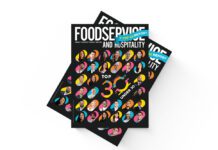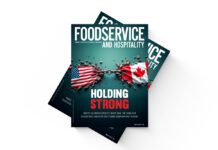In the ride out from yesterday to tomorrow on the road of foodservice environmental responsibility, the message to the back seat is clear: “We’re not there yet.”
But, as much as we’re still putting Styrofoam into the blue box and plastic bags into the ocean, the EU has banned single-use plastics and big companies everywhere are shifting to an economic model that exchanges mining materials and manufacturing products for using resources in closed loops.
“Things are significantly different now than five years ago,” says Bruce McAdams, an associate professor at the University of Guelph’s School of Hospitality, Food and Tourism Management, of the foodservice green scene. He credits three reasons for this shift, plodding and imperfect as it might be: the advent of plant-based diets, the scourge of plastic pollution and the universal tragedy of food waste. “These issues are converging and that’s brought us to a new place.”
Up first is the plant-based diet and the spotlight Canada’s recently revamped food guide shines on it. There’s something about a drive to eat more vegetables — coupled with a culinary movement to exploit their potential — that imposes a greener hue on a restaurant, says McAdams. And this development, he stresses, is here to stay. “The plant-based diet is not a fad.”
On plastics, he calls restaurants reactionary. “We’ve never been leaders in this space. Look at plastic bags in grocery stores — it’s been more than 10 years since grocers started moving away from them.” Restaurants’ plastics exertions, meanwhile, can be misguided. Lucy Cullen, CEO of Terus, a Toronto-based social enterprise that advises restaurants on sustainability, has a beef with so-called biodegradable plastics. “They’re only biodegradable if they get sorted properly,” she says and, in Toronto, they’re not. There, “biodegradable plastics” mostly go into Canada’s biggest city’s organics stream, where they contaminate it — and then it all gets sent to landfills anyway.
Grocery stores also have restaurants beat in food waste — a significant issue for a country that loses or wastes more than half the food it produces. Supermarket products on the brink of expiry have multiple avenues to consumption, from food-bank delivery to discounted “ugly fruit.” But at restaurants, says McAdams, “if my doughnuts aren’t sold in 24 hours, we throw them out.”
McAdams believes the food-waste problem is partly tied to quality control, which he considers among its biggest generators. It’s to blame, he says, for restaurant policies that forbid foodservice workers from accessing unsold food. The fact that a significant chunk of food-bank users work in restaurants, says McAdams, is a sad postscript.
Restaurants have to examine what’s coming back into the kitchen and respond accordingly, says Cullen. Chefs should adjust serving sizes to fit demonstrated appetites and servers should ask whether customers want to take uneaten food home. “When it gets thrown out, is it going to the compost pit? And is that compost going where it should be — or is it going to landfill? Chefs think about prep to plate, not where [food’s] headed next.”
She urges restaurants to make recycling and compost bins central to the dish pit and to augment conversations about food and plastic waste with conversations about hazardous waste. She consulted with a 30-seat restaurant sending 10,000 Hollowick candles to landfill a year. Terus set them up with LED rechargeable replacements that last at least five years and boast paybacks of two to three months.
GREEN TEAMS
Restaurant managers aren’t as strategic with their greening efforts as they could be, says McAdams. “They’re neglecting long-term planning because they’re worrying about the dishwasher breaking down or are responding to a Yelp complaint.”
Indeed, agrees Cullen, “it’s difficult to be thinking about environmental problems when you’re working 15 hours a day just trying to execute the service.”
Enter the green team, an essential employee group that holds meetings, conducts environmental audits (looking at lightbulbs, toilets, garbage, recycling, fridge contents, et cetera) and brainstorms on sustainability. An audit the University of Guelph undertook in the summer of 2018 found just two of 87 restaurants in the Greater Toronto Area had such an internal group.
Champions are great, says Cullen, “but it shouldn’t be down to a couple of passionate people trying to make a difference. It’s got to be embedded in company culture.
At Craft Beer Market’s seven cross-Canada locations, environmental impact was culture-embedded before there was a culture. “We trained staff on this from day one,” says Sales and Marketing manager Joanna Britton. Servers ask customers if they need a bag for their takeaway containers — all of it made from reused materials and compostable since 2013. Even the tray liners can be dumped into the compost with sandwich and nacho remnants, sparing servers the need to sort. Green bins are abundant and garbage pails are scarce in the LEAF-certified restaurants.
The company slogan — “Where everything’s on tap” — is a reference as much to the restaurant’s 160 taps (146 of them beer — the largest draft collection in Canada) as its commitment to reduce its footprint. When Craft’s Bullfrog-powered on-site kegs are empty, they’re sent back to the brewery to get refilled. “People assume it’s all about the beer, but what we’re really trying to do is reduce the packaging.”
And maybe change the world, too. Craft founder and president P. J. L’Heureux says small practices the restaurant instituted in its first operation quickly became part of its DNA, thanks in great part to enthusiastic staffers excited about leading a charge. Today, much of Craft’s greening initiatives take place behind the scenes, outside of consumers’ ken. “If you have dinner here, you’re not aware that we’re composting our food scraps or that employees are wearing uniforms made with waterless technology. It’s just part of our culture. We’re a consumption society and every restaurant is part of that consumption. It’s our duty, as owners, to limit what goes into landfills,” he says.
THE FINANCES OF GREEN
All these efforts come with a price tag and that’s the inherent challenge. Restaurants have been held back by a legacy focus on the business cost of sustainability — a fact that means “some will and some won’t,” says Joanne Pereira, research officer at York’s Schulich School of Business. “You’re going to lose some people. We’re far from being all in.”
But the drive for one green [initiative] is on its way to overpowering the drive for another, says Craft’s Britton. “It is a little more expensive to do, but the costs are coming down because environmental responsibility is expected more.” At Craft Beer Market’s restaurants, the switch to recyclable containers from their wasteful precursors five years ago added 30 per cent to 45 per cent to the operation’s costs; today that’s shrunk to 15 per cent.
THE GOVERNMENT PIECE
But for restaurants to embrace sustainability, especially given the cost of the embrace, higher powers need to get involved. So says Pereira, who calls current legislation — which doesn’t require restaurants to recycle, but recommends it — “wishy-washy.” “If I’m a restaurant owner, I can dump whatever I want into the garbage — there’s no penalty for not doing the right thing. And if you want to do the right thing, there’s a huge cost.”
That’s why government needs to compel businesses to do the right thing, says Britton. “If it wasn’t a choice, that’s how it would be done.” When the Liberals were in power in Ontario, they tabled a new waste act that regulated restaurants with more than 300 kilograms of garbage a week to compost their organic material, like they do in Vancouver. The Conservative government put a hold on that, but McAdams predicts a more progressive Ontario government will soon enact more — and more severe — regulations.
For now, says Cullen, it’s still early days in this battle.
“Restaurants are starting to realize it makes sense for their bottom line — but the conversation’s just starting. The major shift that needs to happen has yet to happen.” Still, says Janine Windsor, founder and president of Victoria-based Leaders in Environmentally Accountable Foodservice (LEAF), the conversation’s starting. “We have to do less educating now than 10 years ago. We used to have to lay out the benefits really clearly; now restaurants are coming to us and saying ‘we know we can do better.’”
Written by Laura Pratt

















